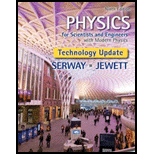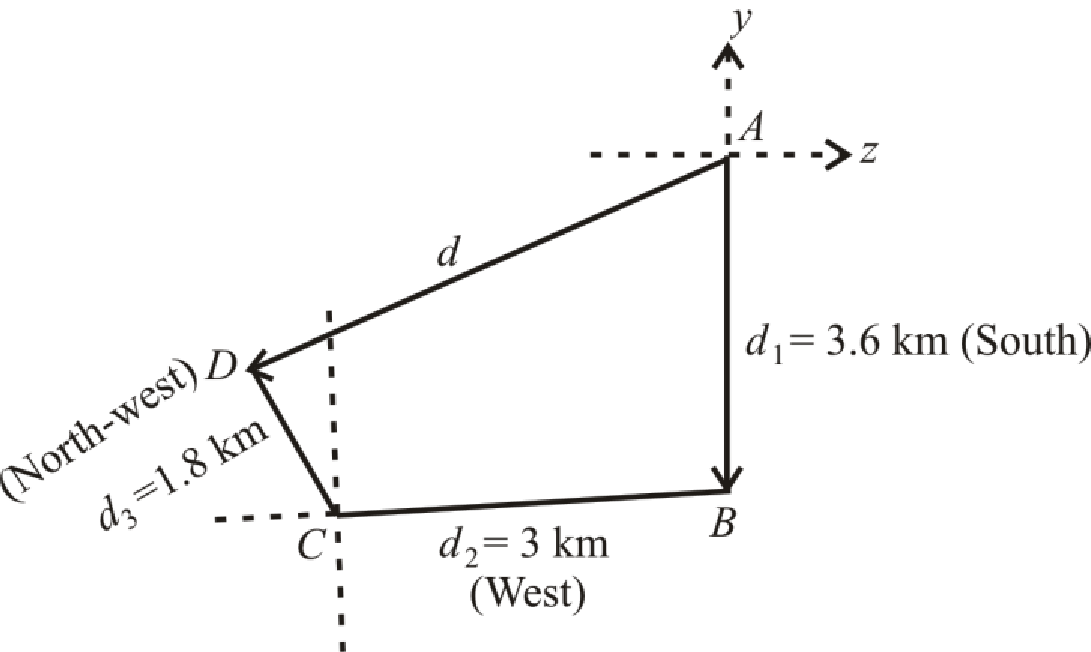
Concept explainers
(a)
The total vector displacement.
(a)
Answer to Problem 1P
The displacement is
Explanation of Solution
Draw the figure according to given condition as.

Consider that system has three vectors.
Write the expression for first trip from point
Here,
Write the expression for second trip from point
Here,
Write the expression for third trip from point
Here,
Write the expression for total displacement in three trips.
Here,
Write the expression for magnitude of the displacement.
Here,
Write the expression for direction of vector d as.
Here,
Conclusion:
Substitute
Substitute
Substitute
Substitute
Substitute
Substitute
Thus the displacement is
(b)
The average speed.
(b)
Answer to Problem 1P
The average speed is
Explanation of Solution
Write the expression for average speed as.
Here,
Conclusion:
Substitute
Simplify further above equation as.
Thus, the average speed is
(c)
The average velocity.
(c)
Answer to Problem 1P
The average velocity is
Explanation of Solution
Write the expression for average velocity as.
Here,
Conclusion:
Substitute
Simplify above equation as.
Thus, the average velocity is
Want to see more full solutions like this?
Chapter 4 Solutions
Physics for Scientists and Engineers with Modern Physics, Technology Update
- What is the y component of the vector (3i8k) m/s? (a) 3 m/s (b) 8 m/s (c) 0 (d) 8 m/s (e) none of those answersarrow_forwardFigure OQ1.13 shows two vectors D1 and D2. Which of the possibilities (a) through (d) is the vector D22D1, or (e) is it none of them? Figure OQ1.13arrow_forwardI have no idea to how to start to this question: Wags (a dog) decides to go on a journey. He begins his journey by traveling 58 meters in a direction directly south. He then runs 100.0 meters in a direction 30◦north of west. During the last leg of his journey, he follows a scent for 59 meters in a direction 30◦east of north. What distance does Wags end up from his initial startingpoint?arrow_forward
- A motorist drives south at 24.0 m/s for 3.00 min, then turns west and travels at 25.0 m/s for 2.60 min, and finally travels northwest at 30.0 m/s for 1.00 min. For this 6.60 min trip, find the following values. Let the positive x axis point east. (a) total vector displacement m (magnitude) ° south of west(b) average speed m/s(c) average velocity m/s (magnitude) ° south of westarrow_forwardA bird flies straight northeast a distance of 95.0 km for 3.0 h. With the x-axis due east and the y-axis due north, what is the displacement in unit vector notation for the bird? What is the average velocity for the trip?arrow_forwardA motorist drives south at 20.0 m/s for 3.00 min, then turns west and travels at 25.0 m/s for 2.00 min, and finally travels northwest at 30.0 m/s for 1.00 min. For this 6.00-min trip, if the positive x-axis points cast, find: a) the total vector displacement b) the average speed c) the average velocityarrow_forward
- A man goes for a walk, starting from the origin of an xyz coordinate system, with the xy plane horizontal and the x axis eastward. Carrying a bad penny, he walks 1300 m east, 2200 m north, and then drops the penny from a cliff 410 m high. (a) In unit-vector notation, what is the displacement of the penny from start to its landing point? (b) When the man returns to the origin, what is the magnitude of his displacement for the return trip?arrow_forwardYou take a three-day hiking. On the first day, you travel 5.0 km heading east. On the second you enjoyed the scenery so much you forgot to take note how far you have walked and in what direction. On the third day, after wandering for 8.5 km and in the direction 370 south of west, you found yourself in the base camp. Determine your displacement during the second day of your trip.arrow_forwardAs it passes over Grand Bahama Island, the eye of a hurricane is moving in a direction 63.0° north of west with a speed of 40.2 km/h. (Let i represent east and j represent north.) (a) What is the unit-vector expression for the velocity of the hurricane? km/h i+ km/hi It maintains this velocity for 3.50 h, at which time the course of the hurricane suddenly shifts due north, and its speed slows to a constant 25.2 km/h. This new velocity is maintained for 1.50 h. (b) What is the unit-vector expression for the new velocity of the hurricane? km/h j km/h i+ (c) What is the unit-vector expression for the displacement of the hurricane during the first 3.50 h? km i+ km j (d) What is the unit-vector expression for the displacement of the hurricane during the latter 1.50 h? km i+ km j (e) How far from Grand Bahama is the eye 5.00 h after it passes over the island? kmarrow_forward
- A student drives his car 6.0 km, North before making a right hand turn and driving 6.0 km to the East. Finally, the student makes a left hand turn and travels another 2.0 km to the north. What is the magnitude of the overall displacement of the student?arrow_forwardA jogger runs 540 m Eastward then runs 320 m Westward, then runs 710m Eastwards and finally 920m Westward. The distance traveled by the jogger is m. The magnitude of his displacement is m in the directionarrow_forwardA space shuttle’s coordinates as functions of time are given by x(t) = 7.0 t^3 and y(t) = 4.0t^2 - 2.1t , where x and y are in meters and t is in seconds. write a vector expression for the ball's acceleration as a function of time.arrow_forward
 Principles of Physics: A Calculus-Based TextPhysicsISBN:9781133104261Author:Raymond A. Serway, John W. JewettPublisher:Cengage Learning
Principles of Physics: A Calculus-Based TextPhysicsISBN:9781133104261Author:Raymond A. Serway, John W. JewettPublisher:Cengage Learning Glencoe Physics: Principles and Problems, Student...PhysicsISBN:9780078807213Author:Paul W. ZitzewitzPublisher:Glencoe/McGraw-Hill
Glencoe Physics: Principles and Problems, Student...PhysicsISBN:9780078807213Author:Paul W. ZitzewitzPublisher:Glencoe/McGraw-Hill

